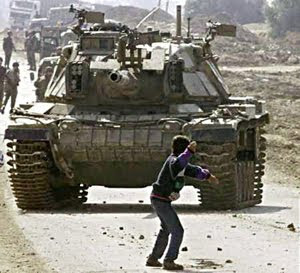http://www.fair.org
Media Advisory
Pundits in Denial on Gaza Plight
'No humanitarian crisis,' some media figures claim
6/7/10
The May 31 Israeli attack on the Free Gaza humanitarian flotilla has returned some media attention to the humanitarian crisis faced by 1.5 million Palestinians living under Israeli blockade in the Gaza Strip. But some media figures have sought to deny the existence of a humanitarian crisis in Gaza at all.
The Gaza Strip remains an ongoing humanitarian catastrophe on numerous levels. Israel has banned imports like cement that are necessary to rebuild Gazan infrastructure--including homes, hospitals and roads destroyed in Israel's 2008-09 invasion (U.N. Development Program, 5/23/10). Water and sewage systems in Gaza are in dire need of repair, and have rendered most of the drinking water unfit for consumption (Amnesty International, 10/09).
Gazans rely on international food aid, but malnutrition and related problems have become more serious as the Israeli blockade has intensified; some 10 percent of Gaza's residents suffer from chronic malnutrition (U.N. World Food Program, 12/09). The blockade has severely affected the Gazan economy, with skyrocketing unemployment and a dramatic decline in per-capita income (London Independent, 6/5/10).
Nevertheless, U.S. corporate media featured numerous confident assertions that there was no need to worry about humanitarian conditions in Gaza:
"But there is a larger issue here. What exactly is the humanitarian crisis that the flotilla was actually addressing? There is none. No one is starving in Gaza. The Gazans have been supplied with food and social services by the U.N. for 60 years in part with American tax money."
--Charles Krauthammer, Fox News (5/31/10)
"But there is no humanitarian crisis in Gaza at all!"
--Monica Crowley, Fox Business Network (6/2/10)
"But there is no humanitarian crisis in Gaza; if anyone goes without food, shelter or medicine, that is by the choice of the Hamas government, which puts garnering international sympathy above taking care of its citizens."
--Daniel Gordis, New York Times op-ed (6/3/10)
"I just had an expert on, a congressman, Mike Pence, from Indiana, who is an expert on this issue as well. He said, look it, there is no humanitarian crisis in Gaza. People are eating in Gaza. There is medical aid. You are talking about paper, crayons and olive trees, and placing basically your volunteers in a potential situation where they could be hurt or even killed."
--CNN's Drew Griffin, interviewing Free Gaza's Greta Berlin (6/2/10)
"If you walk down Gaza City's main thoroughfare--Salah al-Din Street--grocery stores are stocked wall-to-wall with everything from fresh Israeli yogurts and hummus to Cocoa Puffs smuggled in from Egypt. Pharmacies look as well-supplied as a typical Rite Aid in the United States.... Gazans readily admit they are not going hungry."
--Janine Zacharia, Washington Post news article (6/3/10)
"Even though Israel has managed to stave off a humanitarian crisis by allowing the entry of food, fuel and medical requirements, to the world it was engaging in a policy of collective punishment."
--Martin Indyk, Time column (6/14/10)
Such assertions echo Israeli talking points--such as Deputy Foreign Minister Danny Ayalon's claim (Israeli Ministry of Foreign Affairs, 5/29/10), just before the assault, that the flotilla was "a provocation intended to delegitimize Israel. There is no humanitarian crisis in Gaza." The facts as observed by independent organizations prove otherwise--and that's what journalists should be reporting.
Tuesday, June 8, 2010
Pundits in Denial on Gaza Plight
Labels:
Apartheid,
Blockade,
Ethnic Cleansing,
Gaza,
Media,
United Nations,
United States
Subscribe to:
Post Comments (Atom)
Text Widget
/


No comments:
Post a Comment